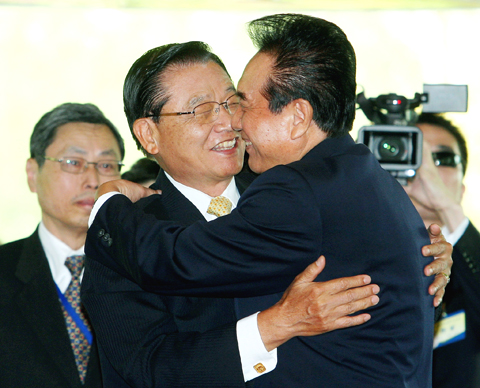Straits Exchange Foundation (SEF) Chairman Chiang Pin-kung (江丙坤), the nation’s chief negotiator with China, arrived in Nanjing, China, yesterday morning on a mission to seal three agreements and one joint statement with China.
The highlight of Chiang’s visit will be a meeting today with his Chinese counterpart, Association for Relations Across the Taiwan Strait Chairman Chen Yunlin (陳雲林).
The two sides are expected to sign three agreements on the launch of regular cross-strait passenger flights, financial cooperation and mutual judicial assistance and cross-strait cooperation to fight crime. Any consensus reached on opening Taiwan to Chinese investment would be covered in a joint statement.

PHOTO: CNA
Representatives of the SEF and ARATS held a preparatory meeting yesterday to finalize the text of the agreements and the joint statement.
Mainland Affairs Council Chairwoman Lai Shin-yuan (賴幸媛), who was at Taiwan Taoyuan International Airport to see off Chiang and his delegation, promised that the SEF’s negotiations with ARATS would be conducted in accordance with the principles of equality and dignity and would uphold the interests of Taiwan and its people.
During the talks, Chiang is also likely to raise a proposal for Taiwan and China to sign an economic cooperation framework agreement (ECFA) as instructed by President Ma Ying-jeou (馬英九) during their meeting on Friday.
Ma has argued that if Taiwan does not sign such an agreement with China, it risks being marginalized and losing its competitiveness because China and neighboring countries are planning to sign free-trade agreements.
Critics, however, warned that the ECFA could jeopardize Taiwan’s sovereignty and make it too economically dependent on China.
Defining the ECFA as an accord about “tariff reduction” and “fair trade,” Lai yesterday said it was essential to normalizing cross-strait trade.
Addressing concerns about the negative impact of the ECFA on local businesses, Lai said in an interview with a radio station in Taichung yesterday that there would be supplementary measures in place and that the government would only open industries that could benefit from and attract Chinese investment.
They will not include industries involved in high-tech development or national security, she said.
A pact on judicial assistance and cooperation to fight crime will allow for the repatriation of Taiwanese fugitives in China to face justice, she said. Of the 85 major Taiwanese economic criminals who have fled to China over the past 10 years, only one has been returned to Taiwan, she said.
Lai said the two sides would also discuss “fifth freedom of the air,” or the right of airlines to operate connecting flights, during the Chiang-Chen meeting, but it would not be the focus of the meeting because of its technical complexity.
Fifth freedom of the air means that an airline can carry passengers from one country to another, and then on to a third country. Beijing has been reluctant to discuss the matter because it touches on the issue of sovereignty.
Also See: Financial deal is ‘ticket’ to Chinese market: FSC head

MORE VISITORS: The Tourism Administration said that it is seeing positive prospects in its efforts to expand the tourism market in North America and Europe Taiwan has been ranked as the cheapest place in the world to travel to this year, based on a list recommended by NerdWallet. The San Francisco-based personal finance company said that Taiwan topped the list of 16 nations it chose for budget travelers because US tourists do not need visas and travelers can easily have a good meal for less than US$10. A bus ride in Taipei costs just under US$0.50, while subway rides start at US$0.60, the firm said, adding that public transportation in Taiwan is easy to navigate. The firm also called Taiwan a “food lover’s paradise,” citing inexpensive breakfast stalls

TRADE: A mandatory declaration of origin for manufactured goods bound for the US is to take effect on May 7 to block China from exploiting Taiwan’s trade channels All products manufactured in Taiwan and exported to the US must include a signed declaration of origin starting on May 7, the Bureau of Foreign Trade announced yesterday. US President Donald Trump on April 2 imposed a 32 percent tariff on imports from Taiwan, but one week later announced a 90-day pause on its implementation. However, a universal 10 percent tariff was immediately applied to most imports from around the world. On April 12, the Trump administration further exempted computers, smartphones and semiconductors from the new tariffs. In response, President William Lai’s (賴清德) administration has introduced a series of countermeasures to support affected

CROSS-STRAIT: The vast majority of Taiwanese support maintaining the ‘status quo,’ while concern is rising about Beijing’s influence operations More than eight out of 10 Taiwanese reject Beijing’s “one country, two systems” framework for cross-strait relations, according to a survey released by the Mainland Affairs Council (MAC) on Thursday. The MAC’s latest quarterly survey found that 84.4 percent of respondents opposed Beijing’s “one country, two systems” formula for handling cross-strait relations — a figure consistent with past polling. Over the past three years, opposition to the framework has remained high, ranging from a low of 83.6 percent in April 2023 to a peak of 89.6 percent in April last year. In the most recent poll, 82.5 percent also rejected China’s

PLUGGING HOLES: The amendments would bring the legislation in line with systems found in other countries such as Japan and the US, Legislator Chen Kuan-ting said Democratic Progressive Party (DPP) Legislator Chen Kuan-ting (陳冠廷) has proposed amending national security legislation amid a spate of espionage cases. Potential gaps in security vetting procedures for personnel with access to sensitive information prompted him to propose the amendments, which would introduce changes to Article 14 of the Classified National Security Information Protection Act (國家機密保護法), Chen said yesterday. The proposal, which aims to enhance interagency vetting procedures and reduce the risk of classified information leaks, would establish a comprehensive security clearance system in Taiwan, he said. The amendment would require character and loyalty checks for civil servants and intelligence personnel prior to